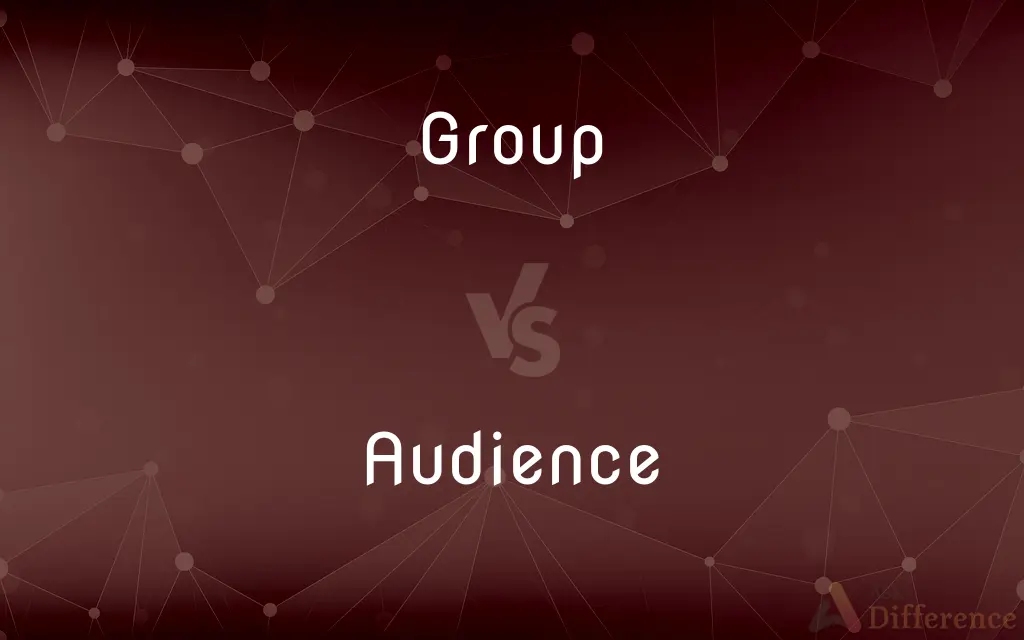Group vs. Audience — What's the Difference?
By Tayyaba Rehman & Maham Liaqat — Updated on April 5, 2024
A group is a collection of individuals who interact and share a common goal, whereas an audience is a gathering of spectators or listeners, often passive in nature.

Difference Between Group and Audience
Table of Contents
ADVERTISEMENT
Key Differences
A group consists of individuals who interact with each other and work towards a common purpose or share similar interests. They often have roles within the group and engage in reciprocal communication. Whereas, an audience is typically assembled to watch, listen to, or read something, usually without direct interaction or a shared goal beyond the consumption of media or performances.
Groups are characterized by active participation among its members. They discuss, decide, and work together, which leads to the development of group dynamics and potentially complex relationships. On the other hand, an audience, although it may react as a whole, usually does not engage in back-and-forth communication with the performers or speakers, nor does it contribute to the content being presented.
Membership in a group is often defined by certain criteria, such as shared goals, interests, or tasks. This membership can influence the identity and actions of the individuals involved. In contrast, audiences are brought together primarily by the event or performance they are attending, with no requirement for ongoing interaction or shared objectives beyond the event.
Groups can vary in size from small gatherings to large collectives, but the emphasis is on interaction and a sense of community. Audiences, while they can also range in size, are defined more by their role as observers or listeners, with the scale of the audience often influencing the nature of the performance or presentation.
While groups may form for a variety of reasons, including work, social activities, or collaborative projects, audiences come together to experience something created by others, whether it's art, music, theater, or a public lecture. The purpose of their assembly is more about reception than active participation or creation.
ADVERTISEMENT
Comparison Chart
Definition
A collection of people with shared goals or interests who interact with each other.
Spectators or listeners gathered to watch, listen to, or read something.
Interaction
High, with reciprocal communication and roles.
Low, primarily unidirectional from performer/speaker to audience.
Purpose
To achieve a common goal, share interests, or work on tasks.
To observe, listen, or experience a performance or presentation.
Membership
Defined by shared goals or tasks and often influences individual identity.
Defined by participation in a specific event, without requiring shared objectives beyond that.
Nature of Assembly
For collaboration, socialization, or achieving specific objectives.
For observation or consumption of content, without active participation in creation.
Compare with Definitions
Group
A number of individuals gathered together, often with a common purpose.
The study group meets weekly to discuss their progress.
Audience
Spectators at a performance or event.
The audience applauded enthusiastically at the concert's end.
Group
A collection of individuals with similar interests.
The book club is a group dedicated to reading and discussing novels.
Audience
Listeners of a public speech.
The lecturer addressed an audience of over 300 people.
Group
Members of an organization or team.
The marketing group is launching a new campaign.
Audience
Viewers of a television show or movie.
The show has a dedicated audience that tunes in every week.
Group
An assembly of people working on a shared task.
The project group is presenting their findings today.
Audience
Readership of a book, magazine, or article.
The magazine's audience is interested in health and wellness.
Group
A social assembly of friends or acquaintances.
Our dinner group tries a new restaurant every month.
Audience
People observing an art exhibit.
The audience was captivated by the new art installation.
Group
An assemblage of persons or objects gathered or located together; an aggregation
A group of dinner guests.
A group of buildings near the road.
Audience
An audience is a group of people who participate in a show or encounter a work of art, literature (in which they are called "readers"), theatre, music (in which they are called "listeners"), video games (in which they are called "players"), or academics in any medium. Audience members participate in different ways in different kinds of art; some events invite overt audience participation and others allowing only modest clapping and criticism and reception.
Group
A set of two or more figures that make up a unit or design, as in sculpture.
Audience
The assembled spectators or listeners at a public event such as a play, film, concert, or meeting
He asked for questions from members of the audience
Group
A number of individuals or things considered or classed together because of similarities
A small group of supporters across the country.
Audience
A formal interview with a person in authority
He demanded an audience with the Pope
Group
(Linguistics) A category of related languages that is less inclusive than a family.
Audience
Formal hearing.
Group
A military unit consisting of two or more battalions and a headquarters.
Audience
A group of viewers or listeners, especially those present at a performance (as a play, concert, or lecture) or a public event (as a rally).
Group
A unit of two or more squadrons in the US Air Force, smaller than a wing.
Audience
The readership for printed matter, as for a book.
Group
Two or more atoms behaving or regarded as behaving as a single chemical unit.
Audience
A group of people who follow or admire an artist or performer
The tenor expanded his audience by recording popular songs as well as opera.
Group
A column in the periodic table of the elements.
Audience
A formal hearing, as with a religious or state dignitary.
Group
(Geology) A stratigraphic unit, especially a unit consisting of two or more formations deposited during a single geologic era.
Audience
An opportunity to be heard or to express one's views.
Group
(Mathematics) A set, together with a binary associative operation, such that the set is closed under the operation, the set contains an identity element for the operation, and each element of the set has an inverse element with respect to the operation. The integers form a group under the operation of ordinary addition.
Audience
A group of people within hearing; specifically, a large gathering of people listening to or watching a performance, speech, etc.
We joined the audience just as the lights went down.
Group
Of, relating to, constituting, or being a member of a group
A group discussion.
A group effort.
Audience
Hearing; the condition or state of hearing or listening.
Group
To place or arrange in a group
Grouped the children according to height.
Audience
A widespread or nationwide viewing or listening public, as of a TV or radio network or program.
Group
To belong to or form a group
The soldiers began to group on the hillside.
Audience
A formal meeting with a state or religious dignitary.
She managed to get an audience with the Pope.
Group
A number of things or persons being in some relation to one another.
There is a group of houses behind the hill;
He left town to join a Communist group
A group of people gathered in front of the Parliament to demonstrate against the Prime Minister's proposals.
Audience
The readership of a book or other written publication.
"Private Eye" has a small but faithful audience.
Group
(group theory) A set with an associative binary operation, under which there exists an identity element, and such that each element has an inverse.
Audience
A following.
The opera singer expanded his audience by singing songs from the shows.
Group
An effective divisor on a curve.
Audience
(historical) An audiencia (judicial court of the Spanish empire), or the territory administered by it.
Group
A (usually small) group of people who perform music together.
Did you see the new jazz group?
Audience
The act of hearing; attention to sounds.
Thou, therefore, give due audience, and attend.
Group
(astronomy) A small number (up to about fifty) of galaxies that are near each other.
Audience
Admittance to a hearing; a formal interview, esp. with a sovereign or the head of a government, for conference or the transaction of business.
According to the fair play of the world,Let me have audience: I am sent to speak.
Group
(chemistry) A column in the periodic table of chemical elements.
Audience
An auditory; an assembly of hearers. Also applied by authors to their readers.
Fit audience find, though few.
He drew his audience upward to the sky.
Group
(chemistry) A functional group.
Nitro is an electron-withdrawing group.
Audience
A gathering of spectators or listeners at a (usually public) performance;
The audience applauded
Someone in the audience began to cough
Group
(sociology) A subset of a culture or of a society.
Audience
The part of the general public interested in a source of information or entertainment;
Every artist needs an audience
The broadcast reached an audience of millions
Group
(military) An air force formation.
Audience
An opportunity to state your case and be heard;
They condemned him without a hearing
He saw that he had lost his audience
Group
(geology) A collection of formations or rock strata.
Audience
A conference (usually with someone important);
He had a consultation with the judge
He requested an audience with the king
Group
(computing) A number of users with the same rights with respect to accession, modification, and execution of files, computers and peripherals.
Group
An element of an espresso machine from which hot water pours into the portafilter.
Group
(music) A number of eighth, sixteenth, etc., notes joined at the stems; sometimes rather indefinitely applied to any ornament made up of a few short notes.
Group
(sports) A set of teams playing each other in the same division, while not during the same period playing any teams that belong to other sets in the division.
Group
(business) A commercial organization.
Group
(transitive) To put together to form a group.
Group the dogs by hair colour
Group
(intransitive) To come together to form a group.
Group
A cluster, crowd, or throng; an assemblage, either of persons or things, collected without any regular form or arrangement; as, a group of men or of trees; a group of isles.
Group
An assemblage of objects in a certain order or relation, or having some resemblance or common characteristic; as, groups of strata.
Group
A variously limited assemblage of animals or plants, having some resemblance, or common characteristics in form or structure. The term has different uses, and may be made to include certain species of a genus, or a whole genus, or certain genera, or even several orders.
Group
A number of eighth, sixteenth, etc., notes joined at the stems; - sometimes rather indefinitely applied to any ornament made up of a few short notes.
Group
To form a group of; to arrange or combine in a group or in groups, often with reference to mutual relation and the best effect; to form an assemblage of.
The difficulty lies in drawing and disposing, or, as the painters term it, in grouping such a multitude of different objects.
Group
Any number of entities (members) considered as a unit
Group
(chemistry) two or more atoms bound together as a single unit and forming part of a molecule
Group
A set that is closed, associative, has an identity element and every element has an inverse
Group
Arrange into a group or groups;
Can you group these shapes together?
Group
Form a group or group together
Common Curiosities
Is it possible for an audience to become a group?
Yes, if audience members connect and decide to pursue shared goals or interests beyond the event, they can form a group.
Can an individual be part of a group and an audience simultaneously?
Yes, an individual can be part of a group that is attending an event together, thus being both a group member and part of the audience.
Can a group have an audience?
Yes, a group can perform or present to an audience, such as a band performing a concert.
How does the size of a group compare to that of an audience?
Both can vary greatly in size, but audiences are typically larger since they consist of individuals gathered to observe rather than interact.
What influences the formation of a group?
Shared interests, tasks, or goals often influence the formation of a group.
Can the internet create virtual groups and audiences?
Yes, the internet facilitates the formation of both virtual groups and audiences, through online forums, social media, and live streaming, for example.
What role does communication play in defining a group versus an audience?
Communication within a group is bidirectional and integral to its function, whereas audience communication is primarily unidirectional, from the performer or speaker to the audience.
Do groups have a more lasting impact than audiences?
Groups may have a lasting impact on their members due to shared experiences and goals, whereas audiences are often temporary assemblies.
What brings an audience together?
An event, performance, or presentation brings an audience together.
Can the purpose of a group evolve over time?
Yes, the purpose and goals of a group can evolve as members interact and take on new challenges.
Does membership in a group affect individual identity?
Yes, group membership can significantly influence an individual's identity and actions.
What makes an audience cohesive?
A shared interest in the event or performance they are attending can make an audience cohesive.
How do social media platforms affect the concept of groups and audiences?
Social media blurs the lines between groups and audiences, enabling more interactive engagement and participation among audience members, potentially transforming them into active groups.
How do shared goals differ between groups and audiences?
Groups have shared goals that require active participation and collaboration, while audiences share the goal of experiencing the content presented to them.
Are audiences passive in nature?
Audiences are generally more passive, engaging in observation rather than active participation.
Share Your Discovery

Previous Comparison
Wrestling vs. Sumo
Next Comparison
Trio vs. TrifectaAuthor Spotlight
Written by
Tayyaba RehmanTayyaba Rehman is a distinguished writer, currently serving as a primary contributor to askdifference.com. As a researcher in semantics and etymology, Tayyaba's passion for the complexity of languages and their distinctions has found a perfect home on the platform. Tayyaba delves into the intricacies of language, distinguishing between commonly confused words and phrases, thereby providing clarity for readers worldwide.
Co-written by
Maham Liaqat















































